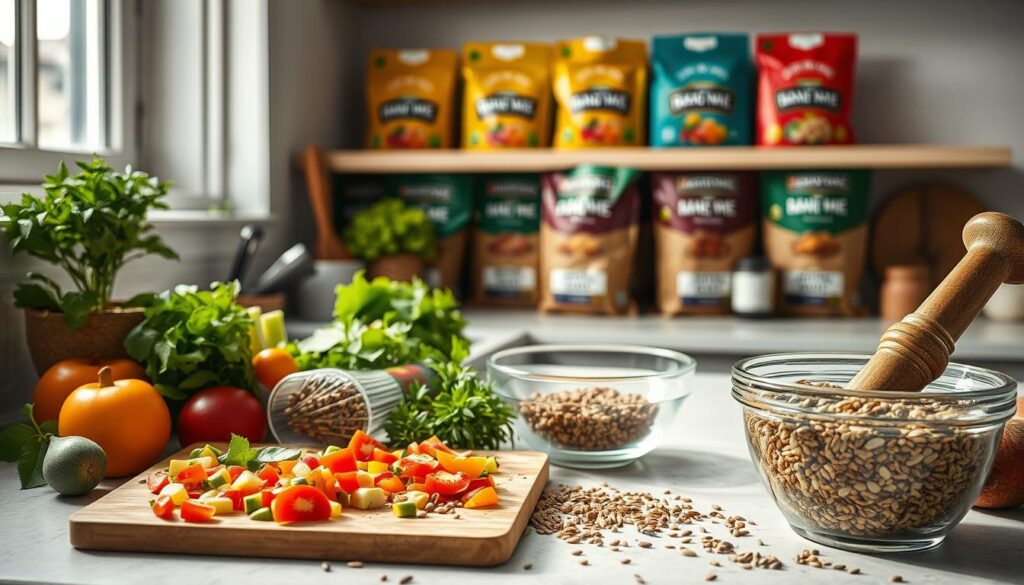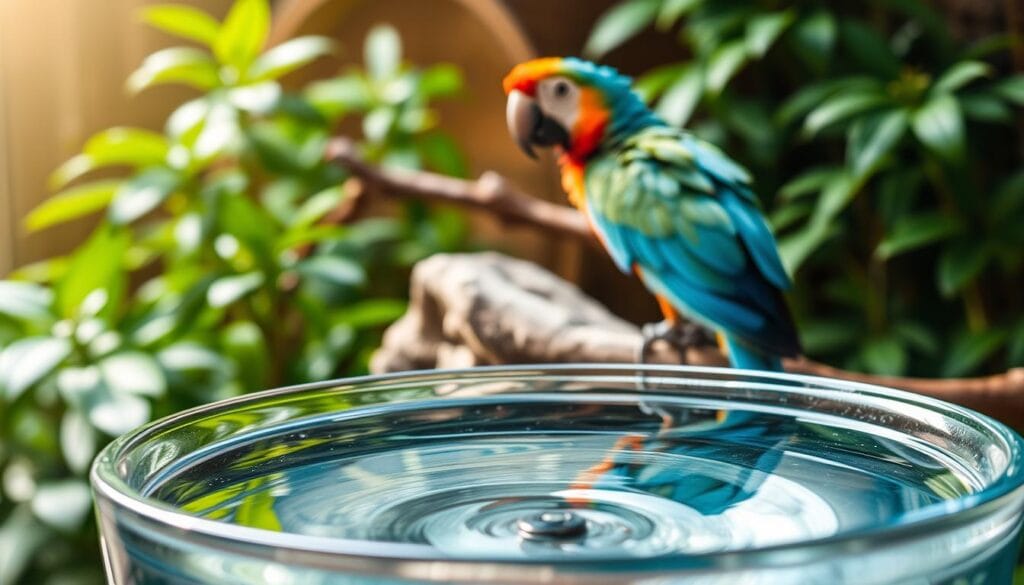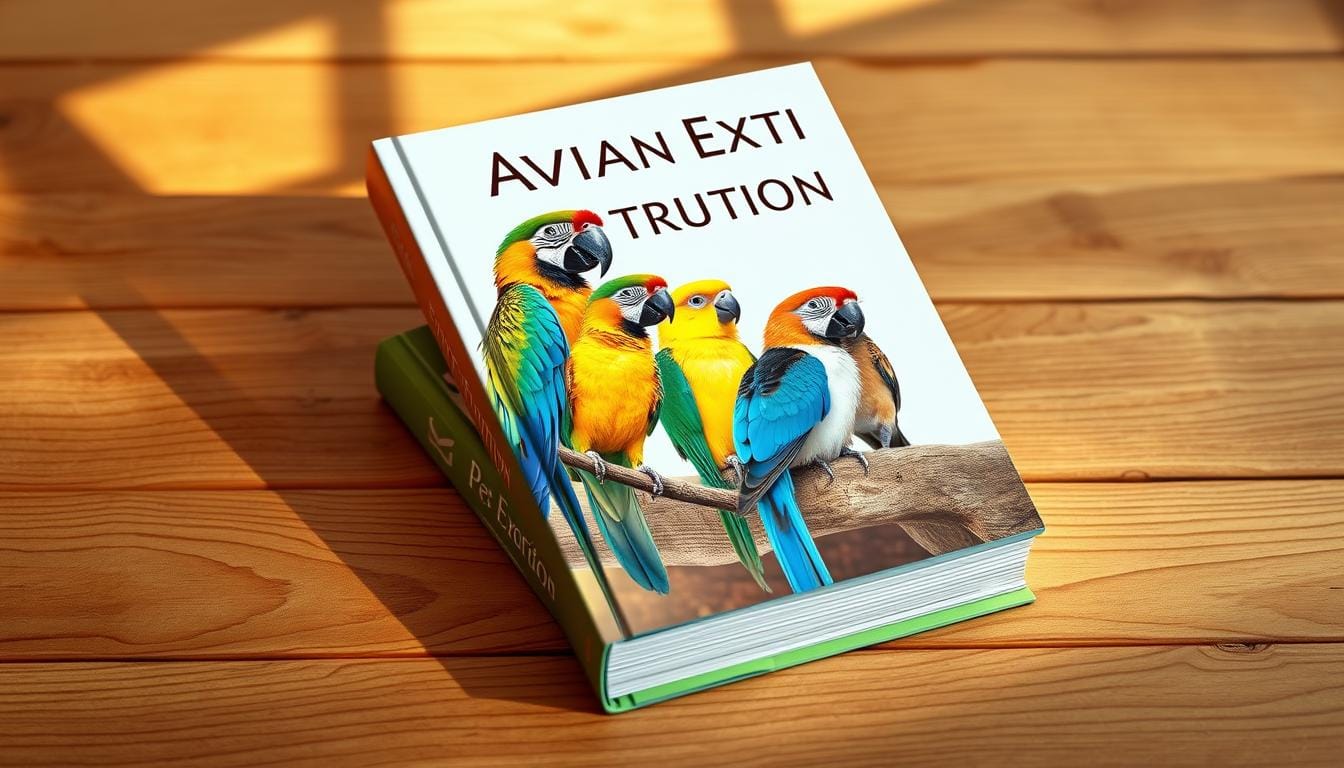As an exotic bird lover, I learned how complex feeding them is. My blue macaw, rescued from a tough past, showed me it’s more than just filling a bowl. It’s about knowing their special dietary needs.
The world of feeding exotic birds is both fascinating and complex. With about 18 million exotic pets in U.S. homes, birds are a big and growing part of our pets. This guide will help you understand the key to keeping your bird healthy and happy.
Feeding exotic birds can be tough. Studies show 60% of avian pets don’t get the right food. Knowing how to feed your bird right is not just a good idea—it’s essential for their health and happiness.
Table of Contents
Understanding Avian Exotic Pets
Exotic birds are now a favorite among pet lovers in the United States. With about six million homes welcoming these birds, knowing how to care for them is key.
Exploring exotic bird diets opens up a world of fascinating pets. These birds offer companionship that needs special care and knowledge.
What Defines an Avian Exotic Pet?
An avian exotic pet has several key traits:
- They are non-traditional bird species kept as pets
- They need special care and food
- They have more complex needs than regular pets
- They have unique behaviors and diets
Common Types of Avian Exotic Pets
Feeding and caring for parrots differ by species. Here’s a look at some popular exotic birds:
| Species | Size | Typical Exotic Bird Diet |
|---|---|---|
| Macaws | Large | Varied seeds, fruits, nuts |
| Conures | Medium | Pellets, fresh vegetables |
| Cockatiels | Small | Mixed seeds, leafy greens |
| African Greys | Medium-Large | Specialized pellet diet |
Knowing your exotic bird’s needs is essential. Each species has its own diet that affects their health and happiness. Research and talking to avian vets can help you give your bird the best life.
Importance of a Balanced Diet
Avian nutrition is key to your exotic pet’s health and long life. Birds need more than just seeds. Knowing their nutritional needs helps avoid health issues and keeps them happy.
Feeding your cockatoo right means balancing many nutrients. This diet affects their health, immune system, and happiness.
Nutritional Needs of Birds
Birds need a variety of foods:
- Proteins for muscle growth
- Carbohydrates for energy
- Healthy fats for body functions
- Vitamins and minerals for health
Consequences of Poor Nutrition
Poor diet can harm your bird a lot. Issues include:
- Weakened immune system
- Metabolic problems
- Feather and skin issues
- Shorter life
A balanced diet is the foundation of your bird’s health and happiness.
About 18 million U.S. homes have exotic pets. Many face challenges in feeding them right. Knowing your bird’s diet needs helps avoid health problems and supports a long, lively life.
Basic Components of Avian Diets
Creating a balanced diet for your exotic pet bird is key for their health and energy. Whether you’re caring for a macaw or a conure, knowing the basics of bird nutrition is vital.
A good diet for birds includes several important nutrients. These nutrients help keep your bird healthy and prevent sickness.
Seeds and Grains: The Foundation of Avian Nutrition
Seeds are important in a bird’s diet, but they shouldn’t be all they eat. Different seeds have different nutrients:
- Sunflower seeds: High in fat
- Millet: Rich in carbohydrates
- Safflower seeds: Moderate nutritional content
Fruits and Vegetables: Essential Nutrients
Fresh fruits and veggies are full of vitamins and minerals. Good choices include:
- Dark leafy greens
- Brightly colored vegetables
- Antioxidant-rich fruits
Protein Sources for Optimal Health
Protein is key for muscle and feather health. Good protein sources are:
- Cooked legumes
- Eggs
- Lean meats
Every bird is different, so talk to a vet to make a diet plan just for your bird.
| Nutrient Category | Recommended Percentage | Key Benefits |
|---|---|---|
| Pellets | 60-80% | Balanced nutrition |
| Fresh Produce | 20-35% | Vitamins and minerals |
| Seeds | 5-10% | Supplemental nutrition |
Remember, your bird’s diet changes with age, health, and breeding. Regular vet visits can adjust their diet plan.
Special Dietary Considerations
Caring for exotic birds means knowing their special diet needs. Unlike common pets, exotic birds need a diet tailored to their.
Species-Specific Nutritional Needs
Feeding lories and lorikeets is unique. These birds need specific foods that other birds don’t. For example:
- Lorikeets need a diet rich in nectar
- Lories require a diet high in sugar
- Seed-eating birds have different nutritional needs
Age-Related Dietary Adaptations
Your bird’s diet changes as it grows. Young birds need more protein. Older birds might need a diet that helps with aging.
Health-Specific Dietary Modifications
Some health issues need special diets. Vets often suggest custom diets for these cases. Choosing the right diet can greatly improve your bird’s health.
Proper nutrition is the cornerstone of exotic pet wellness.
Important diet tips include:
- 60% high-quality pellets
- 30-35% fresh veggies and fruits
- 5-10% extra foods
Knowing these special diet needs helps your exotic bird stay healthy and full of life.
Commercial Diet Options
Finding the right diet for your bird can be tough. The Avian Exotic Pet Feeding Guide helps you choose the best food. This ensures your bird stays healthy and lives a long life.
Pet birds need to eat all the time because they digest food quickly. About 40% of them don’t get enough nutrients. So, picking the right food is very important for canaries and other exotic birds.
Pelleted Diets: A Complete Nutrition Solution
Pelleted diets have changed how we feed birds. They offer balanced meals that are full of vitamins and minerals. These diets have many benefits:
- They are nutritionally complete
- They waste less food than seed mixes
- They help prevent birds from eating only their favorite foods
Fresh vs. Processed Foods: Making Smart Choices
Choosing between fresh and processed foods is key. Look for brands like Harrison’s Bird Foods and ZuPreem. They offer quality pelleted foods that can be mixed with fresh fruits and veggies.
Evaluating Commercial Bird Food Brands
Not all bird foods are the same. Choose brands that show what’s in their food. When picking a brand, consider:
- The quality of the ingredients and where they come from
- If the food is nutritionally complete
- If it’s right for your bird’s species
The quality of your bird’s food can really affect their health. It might even add 15% to 20% to their lifespan. Choosing the right diet is a big step in caring for your exotic pet.
Preparing Fresh Food for Your Bird

Creating a nutritious diet for your exotic bird is important. It’s not just about throwing fruits and veggies in their cage. You need to prepare the right foods to keep your bird healthy and happy.
- Wash all produce thoroughly to remove pesticides
- Cut fruits and vegetables into small, manageable pieces
- Avoid toxic foods like avocados, onions, and garlic
- Introduce new foods gradually over 3-5 days
Washing and Cutting Fresh Produce
Cleaning is key for your bird’s health. Use cool running water and gently scrub produce with a soft brush. Remove seeds from apples and cut foods into bite-sized pieces that match your bird’s beak size. Smaller pieces encourage exploration and prevent choking risks.
Storage Tips for Fresh Foods
Storing fresh foods correctly keeps them nutritious. Keep prepared produce in sealed containers in the fridge. Most cut fruits and vegetables stay fresh for 2-3 days. Remember, fresh produce should make up 20-40% of your bird’s diet.
Ensuring Food Safety
Food safety is critical in managing your bird’s diet. Remove uneaten fresh foods within 2 hours to prevent bacterial growth. Always provide fresh water alongside meals. Monitor your bird’s reaction to new foods and watch for any digestive changes.
Variety is key in parrot feeding – offer multiple colors and types of fruits and vegetables to ensure a balanced diet.
By following these guidelines, you’ll make mealtime safe, nutritious, and fun for your bird.
Feeding Schedules and Portion Control
Keeping your bird healthy means watching what and when you feed it. It’s important to know what your bird needs and stick to a routine.
It’s key to feed your bird at the right times. Most birds, like cockatoos, do best with small meals all day. This helps them stay healthy and active.
How Often to Feed Your Bird
Every bird is different, so their food needs vary. Here’s a basic guide:
- Small birds: 2-3 times daily
- Medium to large birds: 1-2 times daily
- Cockatoos: Daily meals with the right amount of food
Calculating Appropriate Portions
It’s important to control how much food your bird gets. Here’s how to figure it out:
- Use your bird’s weight to measure food
- Stick to these food percentages:
- 60-70% high-quality pellets
- 30-40% fresh veggies and fruits
- No more than 10% treats
- Get advice from a bird vet for your bird’s needs
Signs of Over- or Under-Feeding
Look out for these signs of bad nutrition:
- Over-feeding signs:
- Too much weight
- Less activity
- Hard to fly or move
- Under-feeding signs:
- Too little weight
- Lack of energy
- Feathers look dull
Keep an eye on your bird’s diet and make changes as needed. This helps keep them healthy and happy.
Treats and Supplements
Caring for exotic birds like macaws and conures means paying close attention to their diet. Treats can help bond with your bird, but they need to be chosen wisely.
Safe Treat Options for Exotic Birds
Not all treats are good for macaws and conures. They can have small amounts of healthy snacks. These snacks should be nutritious and fun for your bird:
- Fresh fruits like berries and melon slices
- Small pieces of unsalted nuts
- Vegetable strips
- Occasional millet sprays
Understanding Supplements
Supplements are key to keeping your bird healthy. Vets suggest specific supplements based on your bird’s needs, species, and health.
Foods to Avoid
Some foods are very bad for exotic birds. Avocado is widely considered toxic for birds and should never be given. Other foods to avoid include:
- Chocolate
- Caffeine
- Alcohol
- Salty or sugary processed foods
Always talk to an avian vet to create a diet plan for your bird. This plan should fit your bird’s specific needs during feeding times.
Hydration Needs of Avian Exotic Pets

Water is vital for your avian exotic pet’s health. It’s a key part of caring for your feathered friend. Keeping them hydrated ensures they stay healthy and full of life.
Importance of Fresh Water
Clean, fresh water is a must for your bird’s survival. Lory feeding and other exotic bird care need attention to water quality. Birds lose moisture through breathing and droppings, so they need water every day.
- Provide fresh water twice daily
- Use clean, filtered water
- Replace water immediately if contaminated
- Wash water containers thoroughly
Water Sources and Bowls
The right water container is important for your bird’s hydration. Ceramic or stainless steel bowls are best. They are easy to clean and prevent bacteria.
- Choose wide, shallow bowls
- Avoid plastic containers
- Consider water dispensers with built-in filters
Monitoring Water Intake
Keep an eye on how much water your bird drinks. It’s a sign of their health. Birds need water that’s about 5-10% of their body weight each day.
Watch for signs of dehydration: reduced droppings, sunken eyes, or lethargy.
Keeping humidity levels between 50-70% helps your bird stay hydrated. Regular vet visits are also important. They help keep your exotic pet healthy and well-hydrated.
Environmental Factors Influencing Diet
It’s important to know how the environment affects your bird’s diet. Things like climate, lighting, and mental stimulation are key. They all play a big role in your bird’s health and happiness.
Climate’s Impact on Bird Nutrition
Temperature changes affect how much energy your bird needs. In cold weather, lorikeets might eat more to stay warm. Canaries also adjust their diet based on the temperature outside.
- Cold climates increase energy demands
- Warmer environments may reduce caloric requirements
- Seasonal changes influence dietary needs
Lighting and Nutritional Absorption
Ultraviolet B (UVB) lighting is vital for your bird’s health. Proper exposure helps synthesize vitamin D. This vitamin is key for calcium metabolism and keeping your bird balanced nutritionally.
| Bird Species | UVB Requirement | Dietary Considerations |
|---|---|---|
| Lorikeets | High | Nectar-based diet with supplemental lighting |
| Canaries | Moderate | Seed mix with fresh vegetable supplements |
Enrichment in Feeding Strategies
Making feeding time fun can change your bird’s diet for the better. Using foraging toys and interactive feeding can keep your bird active and engaged. It also adds variety to their diet.
- Create puzzle feeders
- Rotate food placement
- Use varied feeding surfaces
By thinking about these environmental factors, you can create a better feeding plan. This plan will support your bird’s physical and mental health.
Common Feeding Mistakes to Avoid
Dealing with an exotic bird’s diet can be tricky. Many owners accidentally make big mistakes that hurt their bird’s health. Knowing these common errors is key to feeding your parrot right.
Looking after an exotic bird means watching what they eat closely. Here are the main feeding mistakes that can harm your bird:
Overreliance on Seeds
Seeds might look like a great snack, but they’re not enough. In an exotic bird’s diet, seeds should be no more than 10% of what they eat. Many owners feed mostly seeds, which can cause:
- Nutritional deficiencies
- Obesity
- Weakened immune system
- Shorter lifespan
Ignoring Dietary Variety
Feeding your parrot should be varied, not the same every day. They need a mix of foods to stay healthy. High-quality pellets should be 70-80% of their diet, with fresh fruits and veggies making up 20-30%.
Inadequate Fresh Food Provision
Fresh foods are essential for your bird’s health. They give important vitamins, minerals, and keep your bird’s mind sharp. When adding fresh foods to your bird’s diet, remember to:
- Wash produce well
- Cut it into the right sizes
- Start with small amounts of new foods
- Take out any uneaten food quickly
Avoiding these common mistakes will help your exotic bird get the nutrients they need to live well.
Conclusion: Creating a Healthy Feeding Plan
Learning about avian nutrition is a journey that never ends. Your Avian Exotic Pet Feeding Guide has given you the tools to care for your bird. Knowing about diet, environment, and specific needs is key to your bird’s health.
Nutrition is vital for your bird’s health. This guide has shown the importance of balanced diets and portion control. It also talks about adapting to your bird’s special needs. Always seek professional advice and keep learning about avian nutrition.
Your dedication to learning and applying best practices is important. Each bird is different, so what works for one might not work for another. Regular vet visits, watching your bird closely, and being open to change will help your bird thrive.
Key Takeaways
By following the principles of avian nutrition, you can help your bird stay healthy and happy. Stay curious, pay attention, and keep exploring the world of exotic pet care.


Really great info can be found on web site.